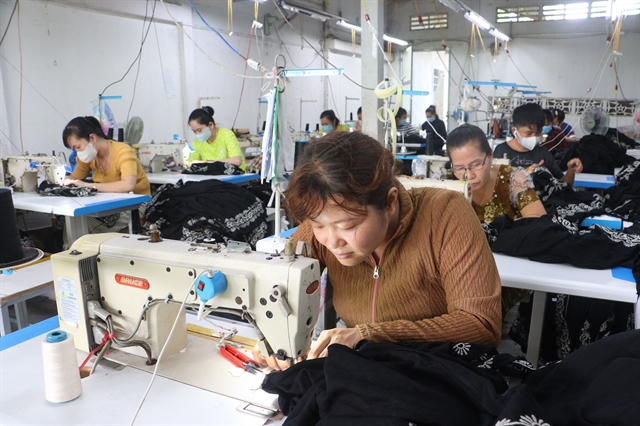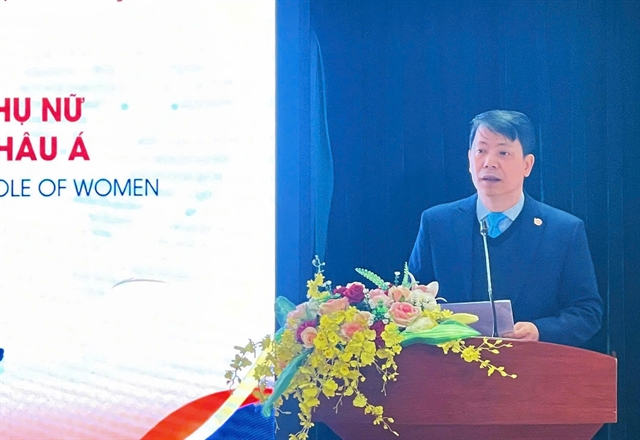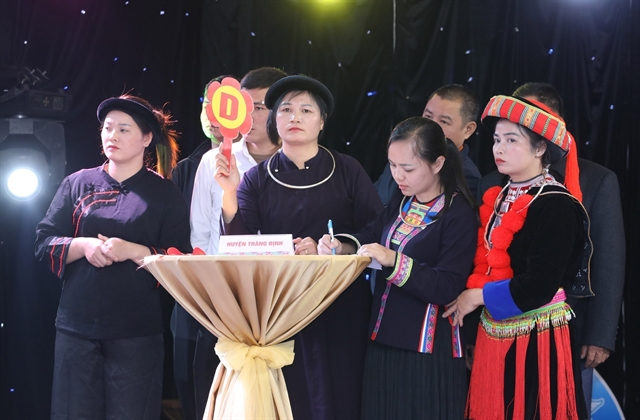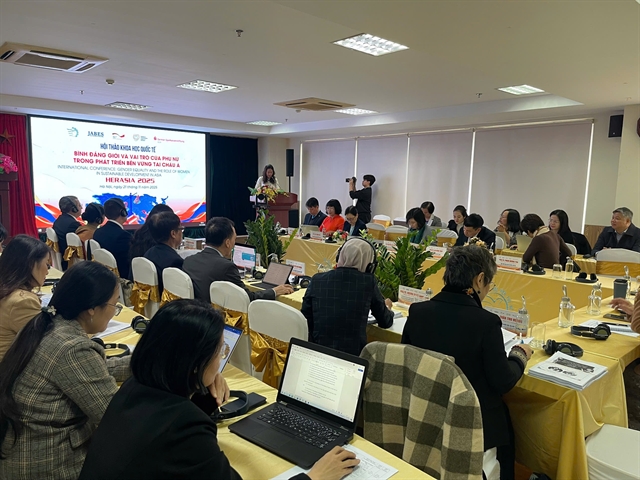 Society
Society

 |
| A women-owned small enterprise in Vĩnh Long Province, which brings stable income to local women. — VNA/VNS Photo Huỳnh Phúc Hậu |
Thu Trang
HÀ NỘI — Gender equality is not only an important social goal but also a foundation to ensure that women and vulnerable groups fairly benefit from development achievements.
Experts believe that gender equality should focus on creating sustainable livelihoods, enhancing internal capacity and strengthening women's resilience to economic shocks, climate change, natural disasters and epidemics.
When women have stable jobs and secure incomes, local and national economies will have a skilled labour force capable of reinvesting and effectively participating in production value chains. This is a crucial condition for expanding markets, increasing labour productivity and enhancing economic competitiveness.
When sustainable livelihood models are designed with women at the centre, women not only increase their income but also elevate their status, voice and ability to participate in community decision-making processes.
Women’s role
The international scientific conference on gender equality and the role of women in sustainable development (HERASIA 2025) was held in Hà Nội as a forum for scientists and experts to share their views and opinions on the issue.
The event, jointly hosted by the Việt Nam Women’s Academy and the Journal of Asian Business and Economic Studies, was sponsored by the German Sparkassenstiftung for International Cooperation (DSIK).
Speaking at the conference, Associate Professor Trần Quang Tiến, director of the Việt Nam Women’s Academy, said: "Gender equality is a fundamental human right and the foundation of a peaceful, prosperous, and sustainable world," adding the United Nations has affirmed gender equality in many documents, including Sustainable Development Goal 5.
 |
| Associate Professor Trần Quang Tiến, director of the Việt Nam Women’s Academy, speaks at the conference. — VNS Photo Thu Trang |
Gender equality is both a standalone goal and a cross-cutting element across 17 Sustainable Development Goals (SDGs). Research on the relationship between gender and sustainable development has attracted a large number of scholars recently due to the theoretical and practical importance of the topic. This research explains why the same SDG policies may produce different results for men and women or reproduce inequalities if they lack a gender lens.
“It also provides compelling quantitative evidence that investing in gender equality is not just an ethical or cultural issue but an economic benefit that promotes growth and poverty reduction,” he said.
Findings affirm that gender equality and women's empowerment are conditions for sustainable institutions, ensuring no one is left behind.
In a context increasingly complicated by severe disasters, natural hazards, epidemics and conflicts – where women and children are often the victims – deep and insightful gender analyses in sustainable development are more necessary than ever for effective policy design and implementation of development solutions.
Christian Grajek, chief representative of Việt Nam Office and Southeast Asia Regional Coordinator under the DSIK, said: “Gender equality is not just a moral imperative – it is an economic and environmental one. In Việt Nam and across Asia, women are central to sustainable development. They are entrepreneurs, innovators, caregivers and community leaders.”
Yet, structural barriers continue to limit their full participation in economic life, he added.
The World Bank estimates that closing gender gaps in labour force participation could boost gross domestic product (GDP) by trillions of dollars globally.
“Việt Nam has made remarkable progress. The country ranks among the top in Asia for female labour force participation – over 72 per cent of women are economically active. Women now hold 30 per cent of seats in the National Assembly, the highest in Việt Nam’s history. But there is more to be done, especially in the digital, green and circular economies,” he said.
Action
 |
| Ethnic women join a competition about gender equality in Lạng Sơn Province. — VNA/VNS Photo Anh Tuấn |
Christian Grajek said that women are increasingly participating in digital platforms and e-commerce. Over 91 per cent of women and girls in Việt Nam use mobile phones.
But digital divides persist.
“Access to technology and digital literacy must be prioritised. Governments and enterprises must invest in inclusive digital infrastructure and training programmes that empower women to lead in this space,” he said.
In the green economy, women are both disproportionately affected by environmental degradation and uniquely positioned to drive solutions.
“From sustainable agriculture to renewable energy entrepreneurship, women are innovating at the grassroots level. Their leadership in climate resilience and green innovation must be recognised and scaled,” said Christian.
The circular economy, which emphasises re-use, recycling and sustainable production, aligns closely with traditional roles women have played in resource management.
“Formalising and supporting these roles through enterprise development can unlock new pathways for economic empowerment,” he said.
Việt Nam’s National Action Plan for Circular Economy (2025–2035) emphasises gender inclusion, green job creation and innovation. For example, women in informal waste sectors – who make up over 60 per cent of the workforce – are being recognised and supported through training and formalisation.
Women-owned small- and medium-sized enterprises should be integrated into value chains, supported through procurement policies and given access to global markets.
“To achieve all these goals, we need robust policy frameworks, informed by research and driven by collaboration. Academic institutions, such as the Việt Nam Women’s Academy, play a critical role in generating evidence, shaping curricula and training future leaders,” he said.
Christian suggested policymakers design and implement inclusive policies that empower women economically and socially; business leaders champion diversity and sustainability in organisations, invest in women-led enterprises and promote inclusive leadership.
“Students and future leaders should be bold, be inclusive and be agents of change. The future of Asia’s sustainable development depends on the full participation of women – not as beneficiaries, but as leaders, innovators and change-makers,” he said.
 |
| Domestic and international experts share their opinions during the scientific conference. — VNS Photo Thu Trang |
Sharing the same view, Nguyễn Thị Tuyết Minh, an expert from the Academy of Journalism and Communication, said that the Vietnamese Government had made considerable efforts to improve the gender gap.
She believes that narrowing the digital gender gap must begin with equipping women and girls with digital skills and enhancing information security capacity.
Building a female startup ecosystem – including capital, mentorship, intellectual property protection and support networks – will expand economic opportunities in the context of digital transformation.
“Gender equality in the digital-green era is a prerequisite for Việt Nam and Asia to achieve sustainable development. Only with inclusive design from the start, combined with data, skills, infrastructure and digital safety, can digital transformation become a lever for gender equality,” said Minh. — VNS




